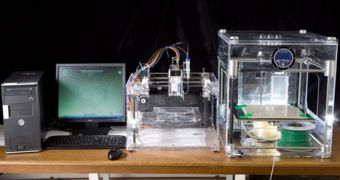It's one thing to order a plastic figurine from a 3D printing service, and another to actually buy your own printer and start experimenting with whatever 3D designs you find on the net or make yourself.
Yet all of that fails to measure up to a certain project undertaken by a company called TeVido BioDevices based in Austin, Texas.
In essence, the scientists took a desk-size, inkjet printer, of sorts, and replaced the cartridge that usually holds ink with one filled with human cells.
Also, instead of paper, the trays holds a specialized gel ready to catch the "printed" cell goo-like substance.
Using all those resources, a computer program deposits cells in layers, one over the other, leading to vaguely biological shapes.
So far, the scientists have managed to produce a transparent, gelatinous substance that, believe it or not, is breast tissue.
It is the researchers’ belief that they can actually 3D-print implants for breast-cancer patients.
Considering that breast-cancer surgeries leave women essentially mutilated, it wouldn't hurt to have a way to restore the breasts to what they used to be.
It should also do wonders to the emotional trauma left behind after the ordeal.
"Having got through the whole emotional trauma that they may die, many women are left disfigured and have to deal with that, also," said Laura Bosworth, CEO and co-founder of TeVido.
Not everyone is as certain of the merits of the research, however. Or at least, they are skeptical about the odds that anything will come out of it. It's one thing to theorize and another to actually make living tissue that won't do more harm than good. Lots of transplants are rejected after all.
"If you 3D print a dress, or a gun, it is pretty easy to tell right away if it works," said Bosworth. "The assays to tell whether bioprinting works are really, really time consuming and expensive."
TeVido fully intends to push forward though, but it's not a given that it will. After all, it has hit a rather nasty but not unexpected problem: lack of funds. We can only wait and see how it all pans out.

 14 DAY TRIAL //
14 DAY TRIAL //